Currency
Recombinant human Flt3L protein (Qk087)
Fms-like tyrosine kinase 3 ligand (Flt-3 Ligand or Flt3L) is a cytokine that is involved in the regulation of hematopoiesis. It stimulates the survival, proliferation, and differentiation of various early myeloid and lymphoid progenitor cells. Flt3L is commonly used in the differentiation of hematopoietic stem cells into dendritic cells.
Human recombinant Flt3L has a molecular weight of 17.6 kDa. This protein is animal origin-free, carrier protein-free, tag-free, and non-glycosylated to ensure a homogenous population with exceptional lot-to-lot consistency. Flt3L is suitable for the culture of reproducible and high-quality myeloid progenitors and dendritic cells.
Orders are typically shipped same or next day (except Friday).
Easy world-wide ordering, direct or through our distributors.
1000µg will be despatched as 2 x 500µg
Fast and free shipping.
Buy online with secure credit card or purchase order.
For any questions, please email orders@qkine.com
Summary
High-purity human protein (UniProt: P49771)
>98%, by SDS-PAGE quantitative densitometry
Expressed in E. coli
17.6 kDa monomer
Animal origin-free (AOF) and carrier protein-free
Manufactured in Cambridge, UK
Lyophilized from Tris
Resuspend in water at >100 µg/ml, prepare single-use aliquots, add carrier protein if desired, and store frozen at -20°C or -80°C
Featured applications
Generation of iPSC-derived myeloid progenitors
Generation of iPSC-derived lymphoid progenitors
Generation of iPSC-derived dendritic cells
Maintenance of peripheral blood cells
Differentiation of peripheral blood cells to myeloid lineages
Differentiation of myeloid cells into dendritic cells
FL; FLG3L; Flt3 ligand; Flt-3 Ligand; Flt3L; FLT3LG; fms-related tyrosine kinase 3 ligand; SL cytokine
human
species similarity:
mouse – 70%
Frequently used together
Bioactivity
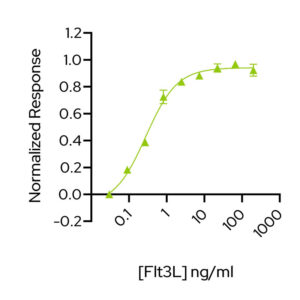
Flt3L activity is determined using proliferation of AML5 human myeloid leukemia cells. EC50 = 0.28 ng/ml (0.016 nM). Cells are treated in triplicate with a serial dilution of Flt3L for 68.5 hours. Cell viability is measured using the CellTiter 96 AQueous One Solution Cell Proliferation Assay (Promega). Data from Qk087 lot #204566.
Purity
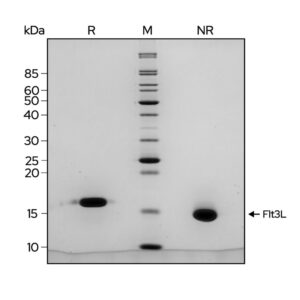
Recombinant Flt3L migrates as a major band at approximately 17.6 kDa in non-reducing (NR) ad reduced (R) conditions. No contaminating protein bands are present. The purified recombinant protein (3 µg) was resolved using 15% w/v SDS-PAGE in reduced (+β-mercaptoethanol, R) and non-reduced conditions and stained with Coomassie Brilliant Blue R250. Data from Qk087 lot #204566.
Further quality assays
Mass spectrometry, single species with the expected mass
Endotoxin: <0.005 EU/μg protein (below the level of detection)
Recovery from stock vial: >95%
We are a company founded and run by scientists to provide a service and support innovation in stem cell biology and regenerative medicine. All our products are exceptionally high purity, with complete characterisation and bioactivity analysis on every lot.
Qkine Flt3L is as biologically active as a comparable alternative supplier protein
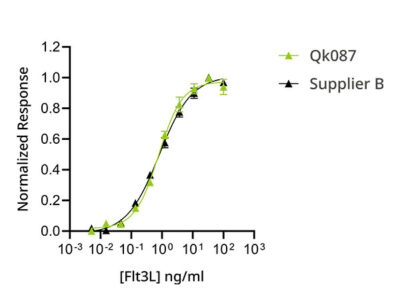
Stimulation of proliferation of AML5 cells with Qkine Flt3L (Qk087, green) and alternative supplier Flt3L (Supplier B black). AML5 human myeloid leukemia cells were treated in triplicate with a serial dilution of Flt3L for 72 hours and proliferation measured using the CellTiter-Glo (Promega) assay.
Protein background
Fms-like tyrosine kinase 3 ligand (Flt-3 Ligand or Flt3L) is a cytokine that is involved in the regulation of hematopoiesis [1–3]. Along with other cytokines, Flt3L stimulates the survival, proliferation, and differentiation of various early myeloid and lymphoid progenitor cells including dendritic cells, NK cells, and B cells [4–6]. Flt3L is indispensable in the differentiation of hematopoietic stem cells to the dendritic cell lineage and is crucial in the initiation of antigen presentation and the development of immune response.
Flt3L is a homodimer of two short chain α-helical bundles [8]. It is released by stromal cells of the bone marrow and thymus such as osteoblasts, fibroblasts, endothelial and perivascular cells [9]. Flt3L specifically interacts with the Flt3 receptor (Flt3/Flk-2), a type III tyrosine kinase receptor expressed on the surface of hematopoietic stem cells, early myeloid and lymphoid progenitor cells, and dendritic cells [10]. Binding to Flt3 triggers the STAT3 signaling cascade [4].
Flt3L is commonly used in cell culture to support the expansion and differentiation of hematopoietic stem cells, particularly to dendritic cells. Flt3L can differentiate induced pluripotent stem cells or peripheral blood monocytes into dendritic cells [4,11]. It acts synergistically with GM-CSF to enhance the proliferation of myeloid progenitors and can further influence the specificity of pre-dendritic cells with other lineage instructive cytokines [12].
The role of Flt3L in promoting the development of dendritic cells and influencing the immune system makes it a target of interest in various therapeutic applications, particularly in the context of immunotherapy and hematopoietic stem cell mobilization [7]. Flt3L has been investigated for its ability to enhance immune responses against cancer and infectious diseases using engineered T cell receptors or CAR T cells [13]. Additionally, it has been studied for its potential to mobilize hematopoietic stem cells, which could be beneficial for certain medical procedures like stem cell transplantation.
Additional resources
Our products are for research use only and not for diagnostic or therapeutic use. Products are not for resale.

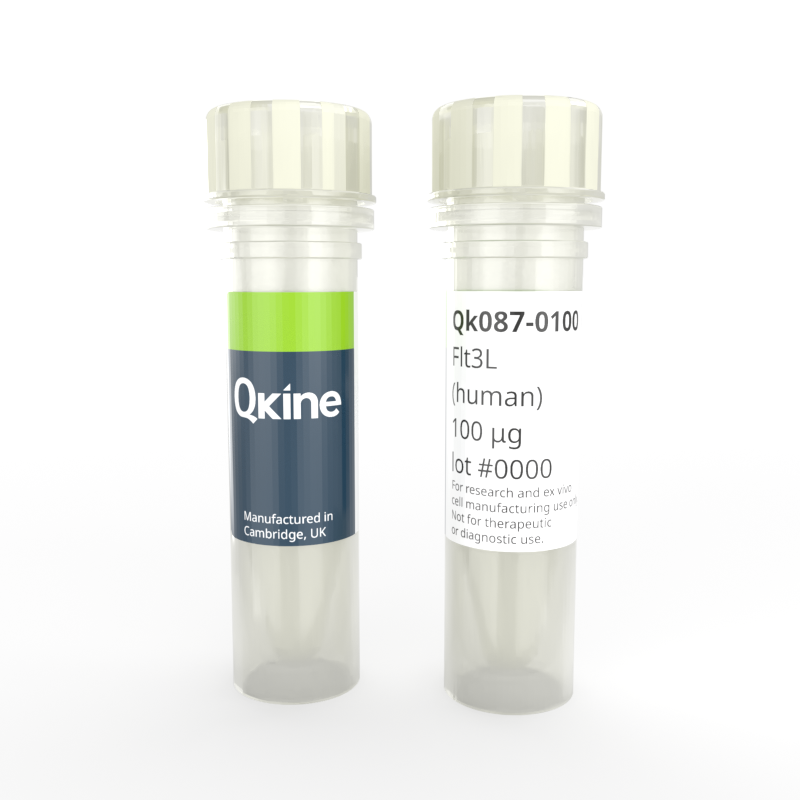
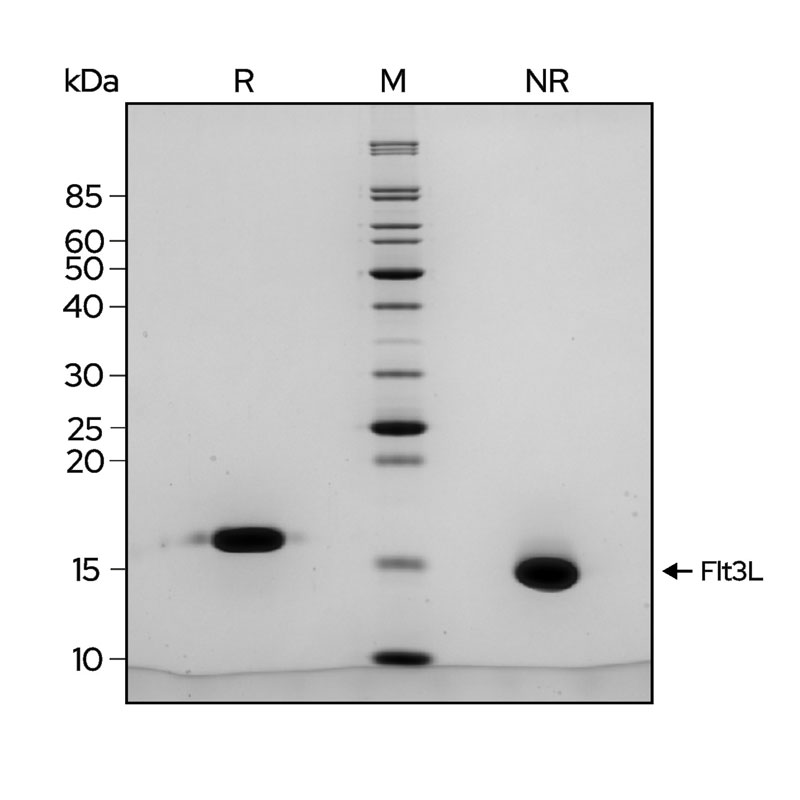
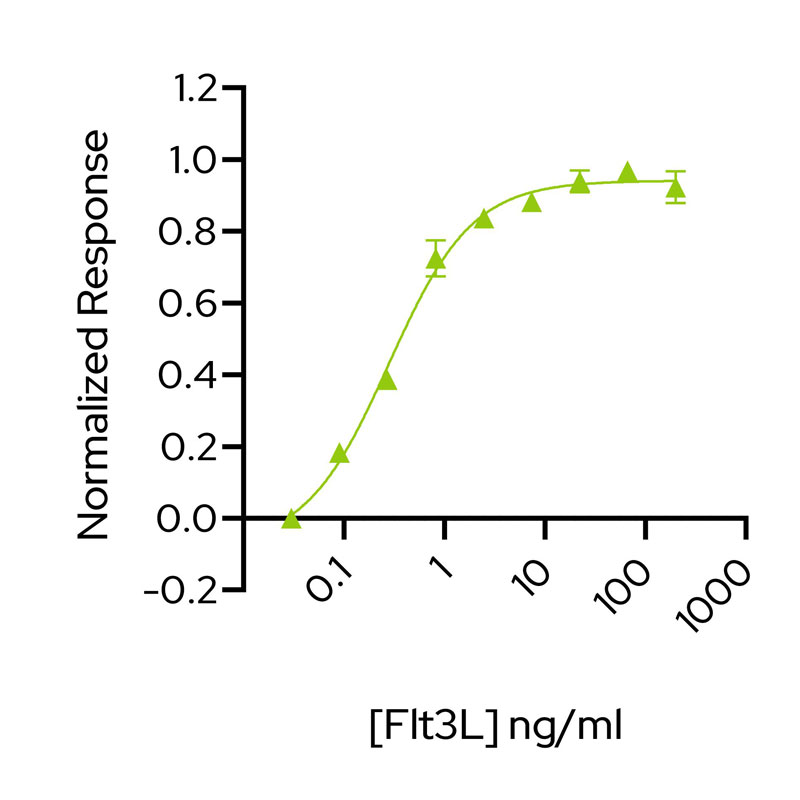

What others are saying
There are no contributions yet.